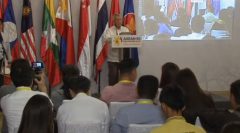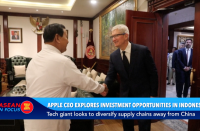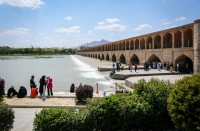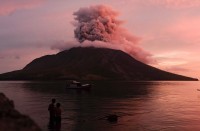
(Reuters) — Southeast Asian countries see China’s installation of weapons systems in the South China Sea as very unsettling and want to prevent militarisation and urge dialogue to stop “recent developments” from escalating, the Philippines said on Tuesday (February 21).
Foreign ministers of the 10-member Association of South East Asian Nations (ASEAN) were unanimous in their concern about Beijing’s reclamation and militarisation of manmade islands, Philippine Foreign Secretary Perfecto Yasay said.
Yasay did not specify which developments provoked the concern, but said the bloc hoped China and the United States would ensure peace and stability.
“On the South China Sea, a number of ministers expressed concern over recent developments and escalation of activities the area which may further raise tensions and erode trusts and confidence in the region. At the same time they noted the need to sustain the momentum of dialogue in order to ease tensions in the region,” Yasay told reporters after a ministers’ retreat on the Philippine island of Boracay.
The Philippines is chairman of the grouping this year and will host its annual meetings, some of which are joined by outside powers, including China and the United States.
Yasay said that ASEAN member states have expressed “strong concern” about China’s installation of weapon systems on its artificial islands.
He also said ASEAN wanted a framework for devising a maritime code of conduct between China and the grouping to be completed by June, and Beijing had shown it was keen for it to be finished.
“We are confident, from the viewpoint of the Philippines, that this code of conduct will be able to, the framework will be completed by the middle of this year, or soon thereafter, simply on the basis of the fact that everyone, including all of the ASEAN member states and China, are pushing hard for this,” Yasay added.
Yasay also said ASEAN nations recognized policies under U.S. President Donald Trump were still “evolving” but hoped he would unveil them within the next few months to provide a “more concrete and clearer picture,” especially regarding China.
“We do not know the complete picture of what this foreign policy might be insofar as the relationship with China is concerned, and China’s relationship with the United states is concerned, or America’s relationship with the rest of the ASEAN members. We are however, hopeful that the policy that would come out would be positive for everyone, and will contribute towards peace stability and progress in the region,” Yasay said.
Friction between the United States and China over trade and territory under U.S. President Donald Trump have fuelled worry that the South China Sea could become a flashpoint, with many Southeast Asian economies are heavily dependent on both powers.
China claims most of the energy-rich waters, through which about $5 trillion in ship-borne trade passes every year. Neighbours Brunei, Malaysia, the Philippines, Taiwan and Vietnam also have claims.
China on Friday (February 17) completed war games involving its own aircraft carrier that unnerved neighbours. The U.S. navy on Saturday said its aircraft carrier strike group had begun routine patrols in the South China Sea.
Three days earlier China warned against that, following an incident in early February when a U.S. Navy P-3 plane and a Chinese military aircraft came close to each other over the South China Sea.
Open in New Window







